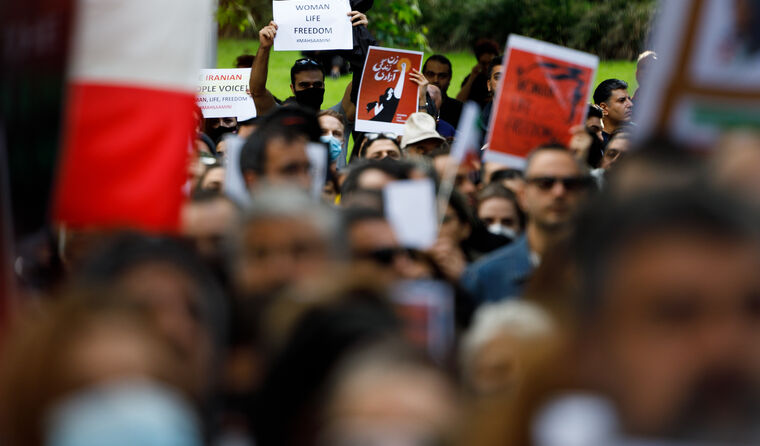News
‘Horrifying and unacceptable’: Plea to protect Iranian doctors
Iranian–Australian GPs and their colleagues have written a powerful condemnation of the treatment of healthcare workers in Iran.
 Dr Farnoush Nia, a Melbourne GP, is working to raise awareness of the plight of medical professionals in Iran.
Dr Farnoush Nia, a Melbourne GP, is working to raise awareness of the plight of medical professionals in Iran.
A group of Iranian–Australian doctors have accused the Iranian Government of ‘horrific’ abuses against medical workers and want to raise awareness of the acute challenges facing healthcare professionals in the country.
They have written to the RACGP describing the Iranian regime’s alleged imprisoning of medical professionals on fabricated grounds, the coercion of doctors to supply false medical statements, and the death of a female surgeon during the violence.
Dr Farnoush Nia, who studied in Tehran and is now an RACGP Fellow practising in Melbourne, helped write the letter. It has been signed by more than 100 Iranian–Australian GPs and doctors in other medical specialities as well as their colleagues.
They expressed ‘grave concerns’ about the ‘deliberate violation of medical neutrality and non-interference with medical services by the Islamic Republic [IR] regime forces’.
Dr Nia says contemporaries from her days as a medical student have been imprisoned, and that she still does not know where some of them are.
She explains why she felt compelled to speak up.
‘It is really disturbing,’ Dr Nia told newsGP. ‘It’s one of those things that really affects our mental health.
‘The worst thing is knowing how helpless they are back there. It really, really affects us.
‘We decided to write this letter because we really feel being their voice is the only thing we can do.
‘None of us are really feeling safe to go back.’
The correspondence says that dozens of doctors and medical students in the country have been detained since the protests began for advocating neutral medical services. The recent violence was prompted by the death of Mahsa Amini, a 22-year-old Kurdish–Iranian woman, following her arrest by the country’s morality police.
The letter also includes an account of a female surgeon who allegedly died from a gunshot wound during protests.
According to the signatories, healthcare workers ‘at all levels’ are being coerced into giving false death certificates and fabricating information for coroners’ reports to disguise the true causes of death.
Reuters reports that at least 300 people have been killed since protests started in September, although human rights organisations believe the true number is likely to be much higher.
Students are also being forced to undergo treatment at mental health facilities involuntarily, the health professionals say – a situation they compare to Gulag jails in the former Soviet Union.
Another concern is that of ambulances being co-opted by the regime forces to move injured protesters into detention, an issue reported in The New York Times last month.
The letter-writers say Iranian residents affected by the violence are reluctant to seek medical care for fear of repercussions.
‘Many are reaching out to doctors secretly to get care – a tremendous risk for both patients and doctors,’ they wrote.
In response to the letter, the RACGP President Dr Nicole Higgins denounced any obstruction of doctors trying to their jobs.
‘Every healthcare professional has the right to treat the injured and the ill without being threatened, assaulted or jailed,’ she told newsGP.
‘We condemn unreservedly any use of violence and coercion against Iranian doctors and nurses simply wishing to treat their communities.
‘The situation their Australian-based colleagues describe is horrifying and unacceptable, and flies in the face of the “first do no harm” ethos of medicine.
‘I stand in solidarity with our brave Iranian colleagues fighting for the basic human right of neutral medical care, and in admiration of the women leading with acts of courage.’

A rally in Sydney on October 1, 2022, with protesters demonstrating against the Iranian authorities. (Image: AAP)
Since the letter was written, Dr Nia says more doctors have been put in jail. She expresses particular concerns surrounding Dr Ibrahim Rigi, a GP in the eastern city of Zahedan, as well as husband and wife Dr Hamid Qarahasanlo and Dr Farzaneh Qarahasanlo, who are medical professionals based in Karaj near Tehran.
They may face the death penalty, Dr Nia believes – and says that they are being denied the right to use their own trusted lawyers.
Meanwhile, an ongoing Parliamentary Inquiry into the human rights implications of the violence in Iran recently heard that surveillance of Iranian–Australians is happening in this country.
It is a risk that Dr Nia acknowledges, but she will not let that stop her from speaking out. Along with her co-signatories, she hopes greater awareness will increase pressure on Iranian authorities to stop killing people and uphold the principles of medical neutrality.
‘It is nothing [in comparison] to people who are going to the streets and … just trying to get very, very basic human rights,’ she said.
‘This is the least we can do.’
Log in below to join the conversation.
do no harm Iran medical neutrality
newsGP weekly poll
Health practitioners found guilty of sexual misconduct will soon have the finding permanently recorded on their public register record. Do you support this change?